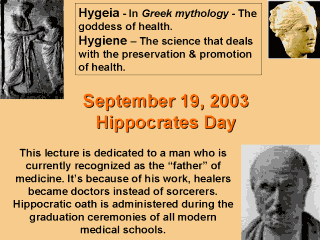| front |1 |2 |3 |4 |5 |6 |7 |8 |9 |10 |11 |12 |13 |14 |15 |16 |17 |18 |19 |20 |21 |22 |23 |24 |25 |26 |27 |28 |review |
 |
Short Biography of Hippocrates
Hippocrates, (460-377? BC), an extraordinary medical writer of Greece. Little is known of his life beyond the fact that he was a physician on the island of Cos, that he belonged to the most intellectual period of Grecian life, and that Hippocrates was singularly free from superstition. Over eighty treatises have been attributed to him, but it now is conceded that some were written by others who borrowed his name and reputation. His works taken together form ten volumes, an encyclopedia of medicine and surgery as known in his day. Hippocrates has been called the father of scientific medicine. He did not believe in miraculous diseases or cures. He taught that proper diet is a necessity of health, and that climate has a profound influence on both mind and body. He died in Thessaly at an advanced age. http://www.sacklunch.net/biography/H/Hippocrates.html Sept. 19th is celebrated as Hippocrates day in Greece. We suggest that Hippocrates day be celebrated world wide for the celebration of prevention, a World Prevention Day where we can work together to prevent disease. On September 19th, 2003, we would like to “marry” the medical concepts of Hippocrates and preventive concepts of Greek goddess of health Hygeia. HYGEIA was the deity of good health and an attendant of her father Asklepios and also Aphrodite who came to represent prevention of disease. The “union” of Hippocrates and Hygeia may also represent two forms of energy, Yan & Yin. For additional information on Hippocrates, visit www.allsands.com/Science/hippocratesbiog_rtb_gn.htm This slide was created by Global Health Network Supercourse team |